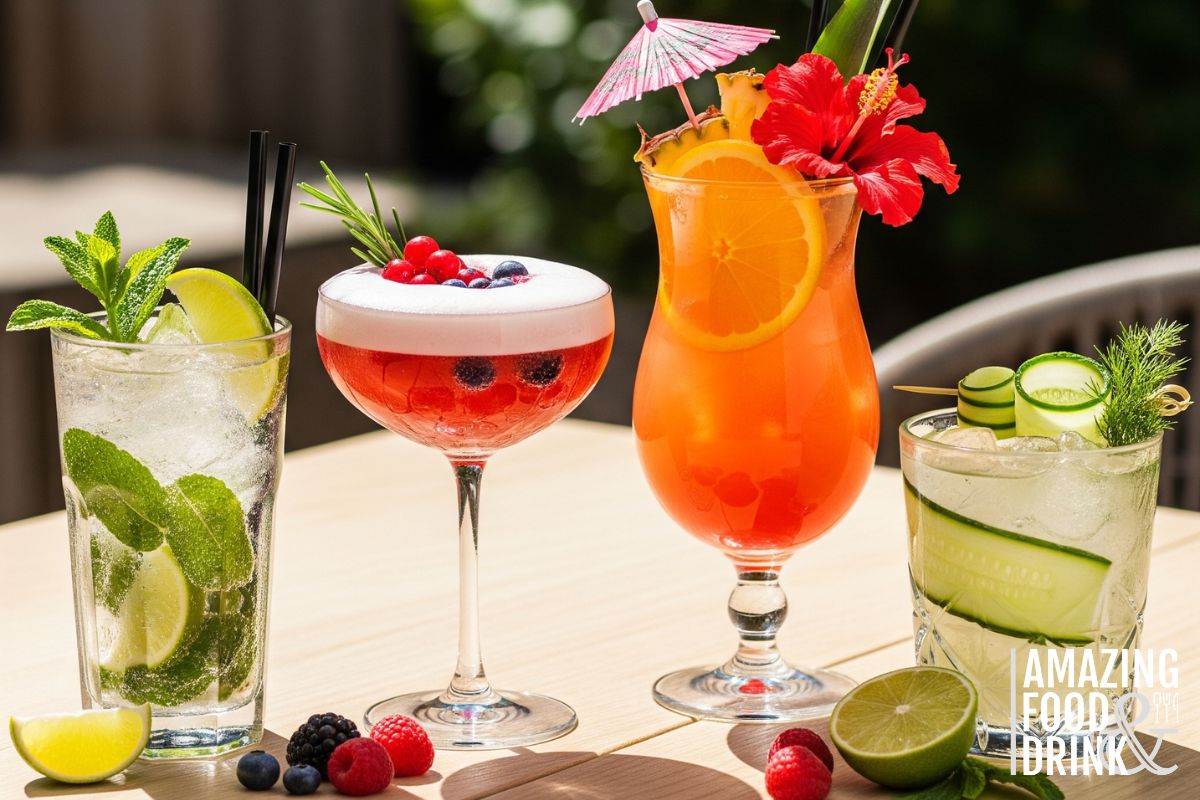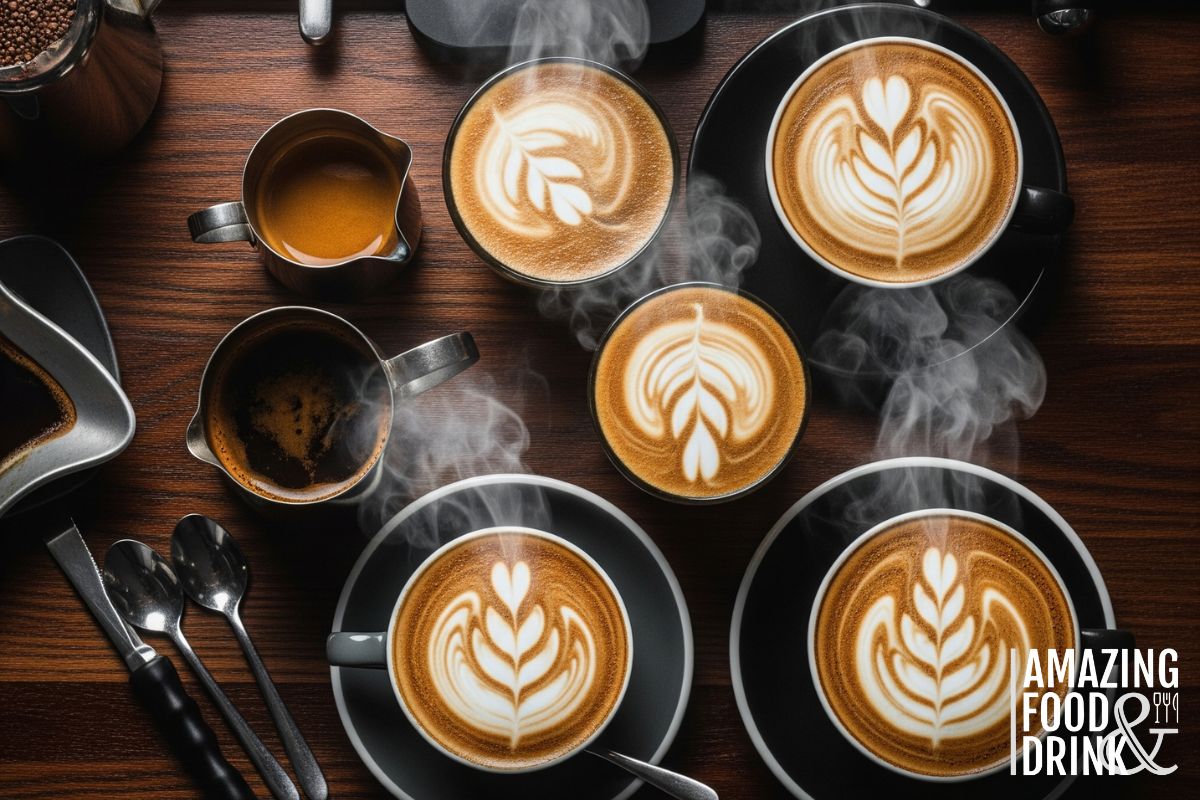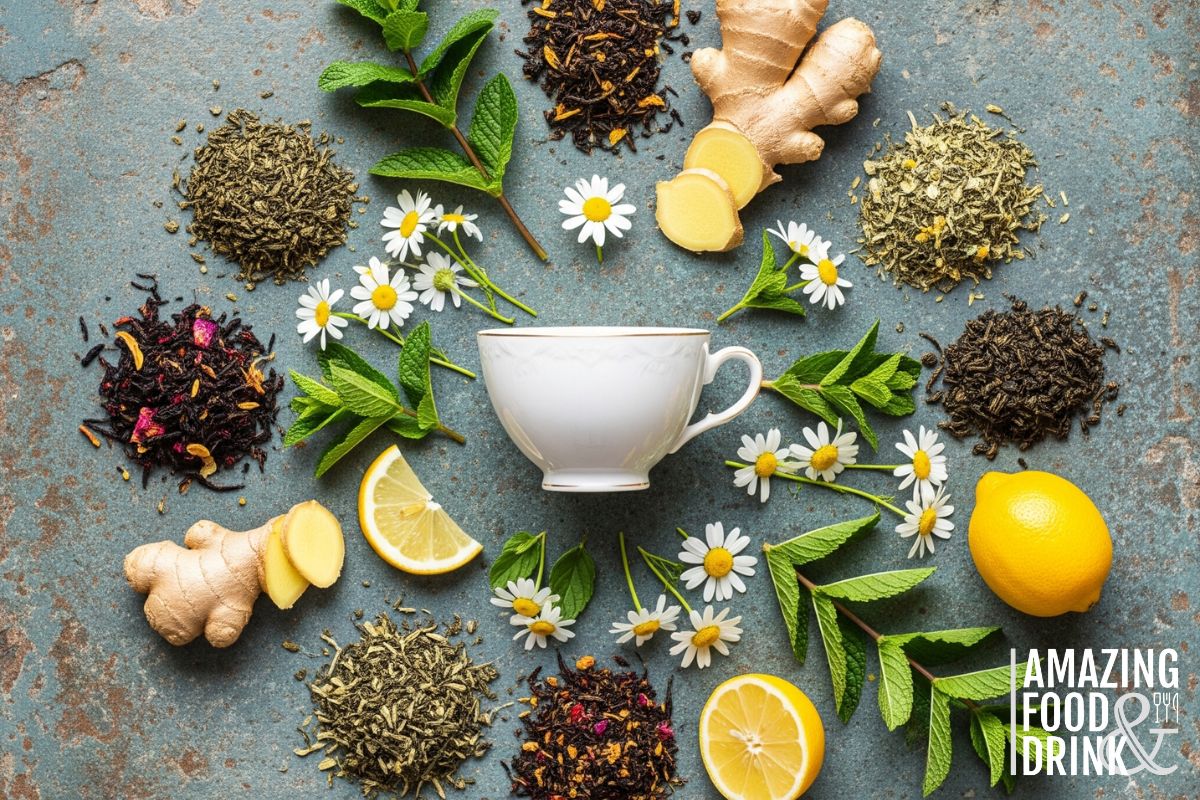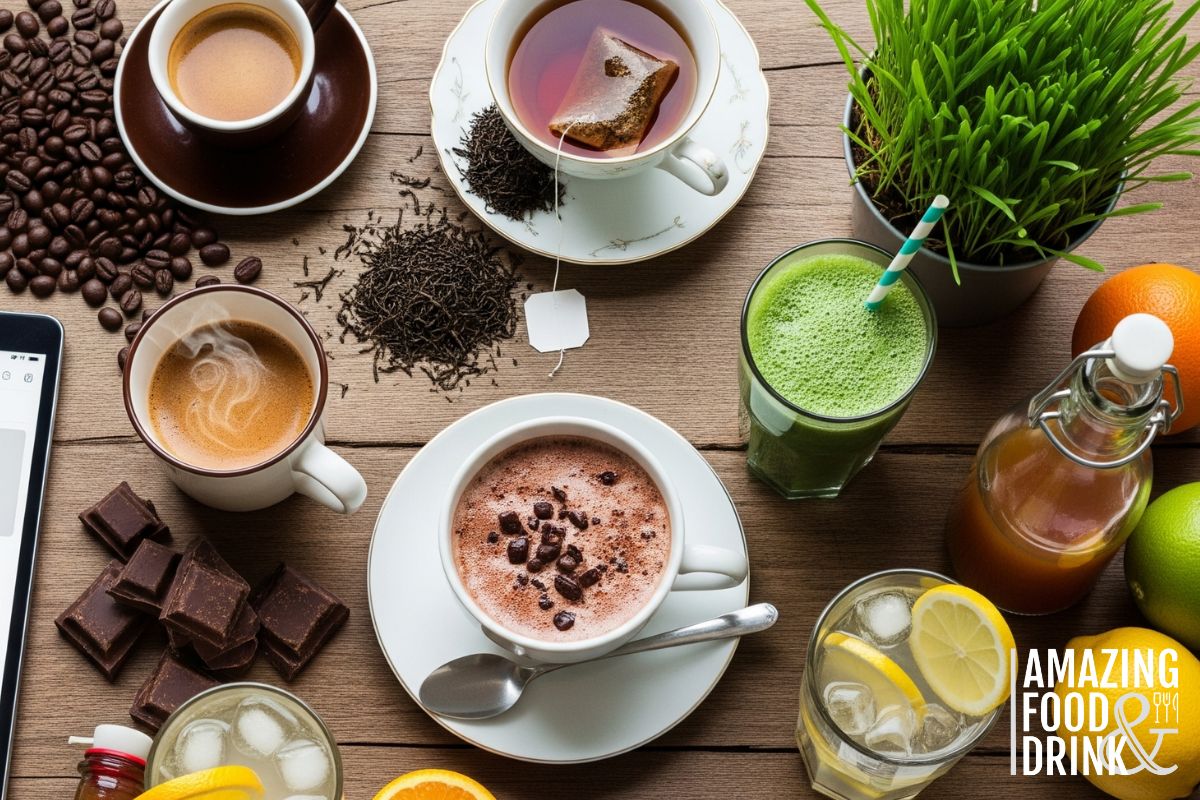The mocktails vs cocktails debate has become one of the hottest topics in the drinks world, and for a good reason. As more people prioritise their health and well-being, non-alcoholic cocktails are experiencing an incredible surge in popularity. Whether you’re looking to reduce your alcohol intake, cut calories, or simply enjoy delicious flavours without the hangover, mocktails offer a refreshing alternative that doesn’t compromise taste.
In this comprehensive guide, we’ll explore everything you need to know about mocktails vs cocktails, including six significant health benefits and three absolutely delicious low-calorie recipes you can make at home today.
Table of Contents
- What Are Mocktails?
- Mocktails vs Cocktails
- Jump to Recipes
- Best Occasions for Mocktails
- Which Should You Choose?
What Are Mocktails? The Complete Guide

Understanding the fundamentals of mocktails is essential before comparing mocktails to cocktails, so let’s explore what makes these alcohol-free drinks so special.
Mocktails are sophisticated non-alcoholic drinks that combine the word “mock” with “cocktails” to deliver all the flavour, complexity, and visual appeal of traditional cocktails minus the alcohol. These alcohol-free drinks use fresh fruits, herbs, spices, premium mixers, and creative techniques to craft refreshing beverages that satisfy your taste buds without compromising your health goals.
Healthy mocktail recipes focus on layered flavours, beautiful presentation, and high-quality ingredients, unlike simple soft drinks or juices. From kombucha-based creations to virgin versions of classic cocktails, the world of non-alcoholic cocktails has evolved far beyond basic fruit punches.
The Clear Winner: Why Mocktails Come Out on Top
The differences between mocktails and cocktails across key health and lifestyle factors are striking. Mocktails typically contain just 50-120 calories per serving compared to cocktails’ hefty 150-400 calories, making them ideal for weight management. With zero alcohol content versus cocktails’ 15-40%, mocktails eliminate dehydration concerns while providing superior hydration through water-rich ingredients.
The financial benefits are equally impressive; mocktails cost £2-4 per drink compared to £6-12 for cocktails when dining out. Most importantly, mocktails offer zero hangover risk and actually promote better sleep quality, unlike alcohol, which disrupts your natural sleep patterns and leaves you feeling groggy the next morning.
Mocktails vs Cocktails: 6 Key Health Benefits

The health advantages of choosing mocktails over cocktails extend far beyond simply avoiding alcohol. These benefits can transform your overall well-being and lifestyle.
1. Significantly Reduce Your Alcohol Intake
The most obvious advantage of comparing mocktails and cocktails is the complete elimination of alcohol. With growing awareness about alcohol’s impact on physical and mental health, many people are choosing to reduce their consumption or eliminate it altogether. The NHS recommends limiting alcohol to 14 units per week, yet many social situations make this challenging.
Mocktails provide the perfect solution, allowing you to enjoy sophisticated drinks at parties, restaurants, and social gatherings without the pressure to consume alcohol. For those with addiction histories or anyone participating in Dry January, Sober October, or similar challenges, alcohol-free drinks offer a sustainable way to maintain social connections whilst prioritising health.
2. Enjoy Far Fewer Calories
The difference between mocktails and cocktails for weight management is substantial. Most low-calorie mocktails contain between 50 and 120 calories per serving, while traditional cocktails typically pack 150 to 400 calories, often more when you factor in sugary mixers and multiple servings.
A standard piña colada contains approximately 380 calories, whilst a virgin version using coconut water and fresh pineapple delivers the same tropical flavours for just 85 calories. This dramatic reduction means enjoying multiple drinks without derailing your fitness goals or feeling guilty about your choices.
3. Stay Properly Hydrated All Day
Unlike alcohol, which dehydrates your body, non-alcoholic cocktails actually contribute to your daily fluid intake. Most healthy mocktail recipes use hydrating bases like coconut water, kombucha, sparkling water, or fresh fruit juices, all of which help maintain optimal hydration levels.
The fruits and vegetables commonly used in mocktails are naturally high in water content, electrolytes, and essential nutrients. Ingredients like cucumber, watermelon, citrus fruits, and leafy herbs add incredible flavour and support your body’s hydration needs, especially during warmer months.
4. Zero Risk of Addiction
Alcohol-free drinks eliminate the risk of developing alcohol dependency, making them a safer choice for everyone. Unlike cocktails, which can lead to problematic drinking patterns, mocktails allow you to enjoy the ritual and social aspects of drinking without any addictive substances.
This benefit is particularly important for young adults, pregnant women, and anyone with a family history of addiction. You can enjoy mocktails regularly without worrying about tolerance, dependence, or the negative health consequences associated with regular alcohol consumption.
5. Get Better Sleep Every Night
The debate on mocktails vs cocktails becomes particularly relevant when considering sleep quality. Alcohol significantly disrupts sleep patterns, preventing deep, restorative sleep and often leading to middle-of-the-night awakening. Even moderate alcohol consumption can reduce sleep quality by up to 39%.
Conversely, mocktails can actually promote better sleep when made with calming ingredients like chamomile, lavender, or magnesium-rich coconut water. You’ll wake up feeling refreshed and energised rather than groggy and dehydrated, a significant advantage for productivity and overall well-being.
6. Endless Delicious Flavour Options
The variety available in non-alcoholic cocktails has exploded in recent years. The flavour possibilities are limitless, from adaptogenic ingredients like ashwagandha and reishi mushrooms to fermented options like kombucha and kefir. Seasonal fruits, exotic herbs, premium tonics, and artisanal syrups create complexity that rivals any traditional cocktail.
Many mocktails actually offer more nuanced flavours than their alcoholic counterparts because alcohol can mask subtle taste notes. Without alcohol’s overwhelming presence, you can appreciate the delicate balance of sweet, sour, bitter, and umami flavours in each sip.
3 Low-Calorie Healthy Mocktail Recipes (Under 100 Calories)
Ready to put theory into practice? These three delicious, low-calorie recipes prove that healthy mocktail recipes can be both nutritious and incredibly satisfying.
Sparkling Cranberry Kombucha Mocktail (85 calories)

This refreshing alcohol-free drink combines the probiotic benefits of kombucha with antioxidant-rich cranberries for a sophisticated mocktail that’s perfect for any occasion.
Prep time: 5 minutes
Serves: 4
Difficulty: Easy
Ingredients:
- 2 bottles (500ml each) of ginger kombucha
- 120ml unsweetened cranberry juice
- 2 tbsp fresh ginger, thinly sliced
- 4 fresh rosemary sprigs
- 100g fresh cranberries
- Ice cubes
- Extra rosemary and cranberries for garnish
Instructions:
- Fill four tall glasses with ice cubes.
- In a large jug, gently muddle the rosemary sprigs and sliced ginger to release their aromatic oils.
- Add the kombucha and cranberry juice to the jug. Stir gently to combine all flavours.
- Pour the mixture into the prepared glasses, ensuring each gets some muddled herbs.
- Garnish with fresh cranberries, ginger slices, and rosemary sprigs. Serve immediately.
Nutritional Information per serving: 85 calories, 2g sugar, 0g fat, rich in probiotics and antioxidants
Virgin Sangria Mocktail (92 calories)

This non-alcoholic version of the Spanish classic delivers all the fruity, refreshing flavours without the alcohol, making it perfect for afternoon gatherings or family celebrations.
Prep time: 15 minutes (plus 4 hours chilling)
Serves: 6
Difficulty: Easy
Ingredients:
- 1 large orange, sliced into rings
- 1 lemon, sliced into rounds
- 2 tbsp pure maple syrup
- 1 Granny Smith apple, cut into wedges
- 150ml fresh orange juice
- 750ml alcohol-free red wine (or grape juice)
- 500ml sparkling elderflower water
- Fresh mint leaves for garnish
Instructions:
- Place the orange slices, lemon rounds, and maple syrup in a large glass pitcher.
- Using a wooden spoon, gently muddle the fruit to release the natural juices without completely crushing it.
- Pour in the orange juice and alcohol-free red wine. Add the apple wedges and stir well.
- Refrigerate for at least 4 hours or overnight to allow flavours to meld.
- Just before serving, add the sparkling elderflower water and stir gently.
- Serve over ice in wine glasses, ensuring each serving gets plenty of fruit. Garnish with fresh mint.
Nutritional Information per serving: 92 calories, 15g natural sugars, 0g fat, high in vitamin C
Grapefruit Mint Kombucha Mocktail (78 calories)

This zesty, refreshing mocktail combines the tangy brightness of grapefruit with cooling mint and probiotic-rich kombucha for a truly invigorating drink.
Prep time: 8 minutes
Serves: 2
Difficulty: Easy
Ingredients:
- 1 large pink grapefruit, juiced
- Juice of 1 lime
- 2 lime wedges
- 8-10 fresh mint leaves, plus extra for garnish
- 240ml plain kombucha
- 200ml grapefruit-flavoured sparkling water
- Ice cubes
- Grapefruit wheels for garnish
Instructions:
- In a cocktail shaker, combine the fresh grapefruit juice and lime juice. Shake vigorously for 30 seconds.
- Add the mint leaves to the shaker and muddle gently to release the oils without shredding the leaves.
- Add the muddled mint to the shaker with the citrus juices and shake again.
- Fill two tall glasses with ice cubes.
- Pour half the kombucha into each glass, followed by half the citrus and mint mixture.
- Top each glass with grapefruit sparkling water and stir gently.
- Garnish with grapefruit wheels, fresh mint sprigs, and lime wedges.
Nutritional Information per serving: 78 calories, 12g natural sugars, 0g fat, rich in vitamin C and probiotics
Best Occasions for Mocktails
Knowing when to serve non-alcoholic cocktails can help you make the most of these versatile drinks across various social situations.
Non-alcoholic cocktails are perfect for numerous occasions where you want sophisticated drinks without alcohol:
- Pregnancy celebrations and baby showers
- Morning and afternoon events like brunches and garden parties
- Family gatherings where children and adults can enjoy the same beverages
- Workplace functions and professional networking events
- Fitness-focused social events and wellness retreats
- Religious or cultural celebrations where alcohol isn’t appropriate
- Recovery celebrations and sober social groups
Mocktail Ingredients to Stock
Building a well-stocked mocktail pantry ensures you can create impressive alcohol-free drinks whenever inspiration strikes.
To create restaurant-quality alcohol-free drinks at home, keep these essential ingredients on hand:
Base liquids: Kombucha, coconut water, premium tonic water, sparkling elderflower water, fresh fruit juices
Flavour enhancers: Fresh herbs (mint, basil, rosemary), citrus fruits, ginger, premium syrups, bitters (alcohol-free versions available)
Garnishes: Edible flowers, fruit wheels, herb sprigs, coloured ice cubes, premium salt for rimming glasses
Mocktails vs Cocktails: Which Should You Choose?

Choosing between mocktails and cocktails depends on several personal factors only you can evaluate for your lifestyle.
The answer depends entirely on personal goals, health considerations, and lifestyle preferences. If you’re focused on:
- Weight management: Choose mocktails for significantly fewer calories
- Better sleep: Opt for non-alcoholic cocktails to avoid sleep disruption
- Hydration: Mocktails contribute to daily fluid intake rather than dehydrating you
- Social drinking without alcohol: Mocktails provide the same social experience
- Pregnancy or medical considerations: Alcohol-free drinks are the only safe option
- Cost savings: Mocktails typically cost 50-70% less than cocktails when dining out
However, if you enjoy alcohol responsibly and within recommended guidelines, occasional cocktails can be part of a balanced lifestyle. The key is making informed choices based on your circumstances.
The mocktails vs cocktails debate ultimately comes down to personal choice, but the health benefits of choosing alcohol-free drinks are undeniable. From significantly fewer calories and better hydration to improved sleep quality and zero addiction risk, mocktails offer a sophisticated way to enjoy social drinking without compromising your well-being.
Whether you’re permanently switching to non-alcoholic cocktails or simply incorporating more alcohol-free options into your routine, these three low-calorie recipes provide the perfect starting point. With endless flavour combinations and health benefits, mocktails prove that you don’t need alcohol to create memorable, delicious drinks that everyone can enjoy.
Try these healthy mocktail recipes today and discover why so many people are making the switch from cocktails to their alcohol-free alternatives. Your body, your wallet, and your morning-after self will thank you!
FAQs
1. What’s the difference between mocktails and cocktails?
Mocktails are non-alcoholic beverages that mimic cocktails using fruits, herbs, and mixers without alcohol. Cocktails contain alcohol as their primary ingredient, whilst mocktails focus on flavour complexity without the alcohol content, making them suitable for everyone, including pregnant women and children.
2. Are mocktails healthier than cocktails?
Yes, mocktails are generally healthier than cocktails. They contain fewer calories (50-120 vs 150-400), provide better hydration, don’t disrupt sleep patterns, and offer vitamins and minerals from fresh fruits and vegetables. They also eliminate the health risks associated with alcohol consumption.
3. How many calories are in mocktails vs cocktails?
Most healthy mocktail recipes contain 50-120 calories compared to cocktails, which typically have 150-400 calories per serving. This makes mocktails the better choice for weight management and allows you to enjoy multiple drinks without exceeding your daily calorie goals.
4. Can mocktails taste as good as cocktails?
Absolutely! Modern mocktails use sophisticated ingredients and techniques that create complex, layered flavours. Without alcohol masking subtle taste notes, many people find mocktails actually offer more nuanced and refreshing flavour profiles than traditional cocktails.
5. Are mocktails suitable for children?
Yes, most mocktails are perfectly suitable for children, though you should check individual recipes for any ingredients that might not be appropriate for young ones. Many families enjoy creating mocktails together as a fun, healthy activity that everyone can participate in.
6. Do mocktails have any downsides?
The main consideration with mocktails is their sugar content, particularly if made with fruit juices or syrups. However, this is easily managed by choosing recipes with natural fruit sugars and avoiding added sweeteners. For diabetics, monitoring the natural sugar content in fruit-based mocktails is important.



